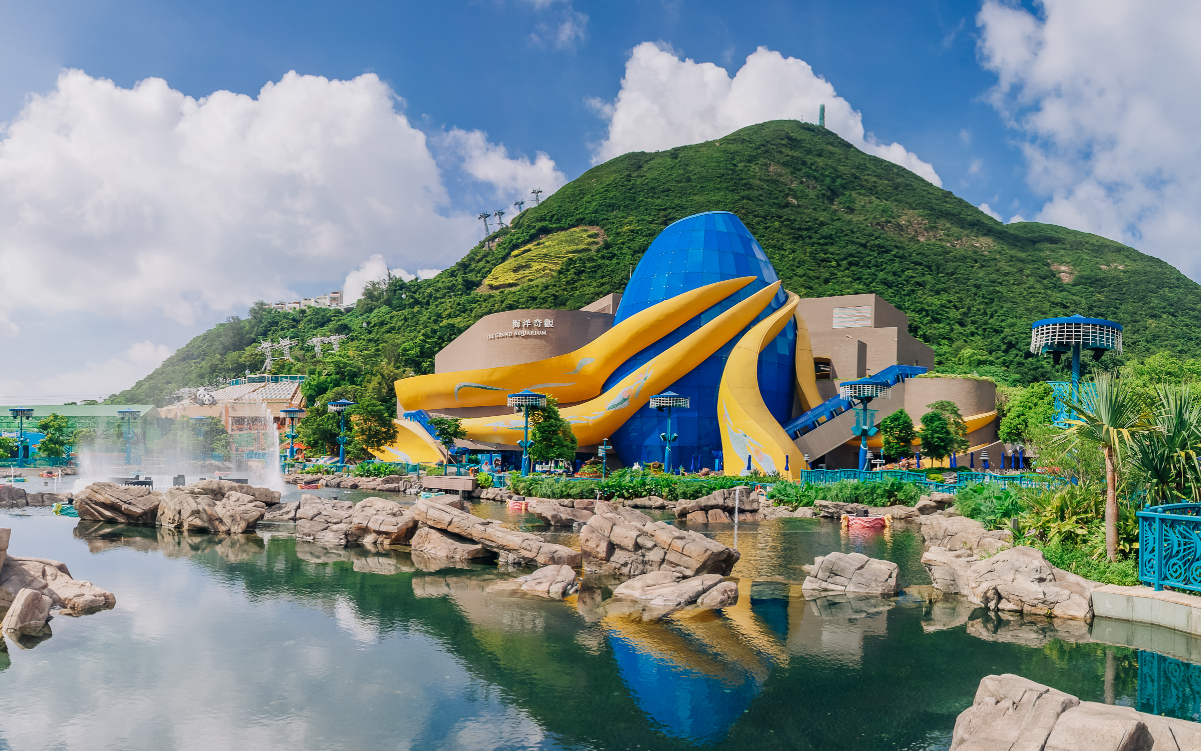(5 November 2012, Hong Kong) Being Hong Kong People’s Park and a responsible corporation dedicated to “connecting people with nature”, Ocean Park is committed to combating global climate change by doing its part in response to the global call to achieve Hong Kong’s carbon reduction targets. In light of this, Ocean Park has previously engaged Carbon Care Asia, an independent carbon management consultant, to assist in conducting Park-wide carbon audits and developing a 10-year Carbon Footprint Management Plan. With 2011/12 chosen as the base year, Ocean Park is targeting to reduce its absolute carbon emissions by 10% and its carbon intensity (with the number of guests as the normalising factor) by 25%. These targets represent new standards in carbon management for the theme park industry. Among the many carbon-reducing measures are the development of a highly energy-efficient Life Support System (LSS) for animals, the installation of solar-panels on electric carts, and conversion of food waste to animal feed. In addition to environmental protection, these initiatives are also expected to reduce approximately HK$70 million in utility costs over the next ten years.
Mr. Matthias Li, Deputy Chief Executive of Ocean Park, said, “As a leading, world-class theme park, Ocean Park is continuously looking for ways to enhance the eco-friendliness of the Park and the industry as a whole. In February 2012, we invited several renowned green groups and like-minded corporations to share with us their experiences in carbon management, thereby helping us plan a series of carbon management programmes and set specific carbon reduction targets. These programmes and targets together constitute Ocean Park’s Carbon Footprint Management Plan, which was approved by our Board of Directors in June this year. As well, an Environment and Carbon Management Steering Committee, comprised of senior representatives from each division and a newly appointed carbon management officer, was established to make detailed plans for carbon reduction. By implementing various programmes, we target to reduce our absolute carbon emissions, referencing 2011/12 as the base year, by 10% and carbon intensity by 25% within the next ten years. We will also conduct regular carbon audits to monitor our progress.”
Ocean Park’s Carbon Footprint Management Plan is divided into the following four areas:
Investing an estimated amount of over HK$50 million on carbon reduction programmes in order to generate an expected savings of HK$70 million in utility costs over the next 10 years. The Carbon Reduction Plan will be updated continuously as new initiatives are identified and adopted
1. Putting in place staff awareness training programmes and encouraging them to adopt a low-carbon lifestyle at work and in their personal life
2. Educating the public about the impact of climate change on polar animals and the planet through in-Park low-carbon experiences, educational courses and displays, with the aim of raising awareness of sustainable development among the public, thereby encouraging them to adopt a low-carbon lifestyle
3. Conducting periodic progress reviews and monitoring carbon reduction achieved
Dr. Trini Leung Wing-yue, Executive Director of Carbon Care Asia, said, “Carbon footprint management and reduction is an important act of social responsibility of corporations of our time. We have been assisting OPC to establish carbon management system and carbon reduction strategy in accordance to high standards since 2008. With the completion of most new facilities in 2012, we recommend that OPC set the base year of carbon plan to 2011-12., which recorded 56,906 tonnes of carbon emissions.”
Research has shown that electricity consumption is a major source of the Park’s carbon emissions, accounting for more than 80% of total carbon emissions. Therefore, reducing the use of electricity would be a very direct and effective means of carbon reduction. Ocean Park thus has developed various carbon reduction measures, including a new, highly energy-efficient LSS currently being built. Mr. George Tso, Ocean Park’s Executive Director of Engineering, explained, “A series of upgrades on the Life Support System for animals in Ocean Park will be implemented in the next 10 years, including switching to highly efficient water-cooled chillers, using low-GWP (Global Warming Potential) refrigerant, as well as strengthening insulation to reduce energy loss. We will also enhance control of our animals’ environment with real-time computer monitoring to adjust the exchange of water, the inflow of fresh air, and water flow rates. These will enable us to provide energy-efficient living environments for our animals. Moreover, we will re-route some pipes to shorten the pipe route to draw seawater, thereby creating a more energy-efficient water circulation system. We have also installed solar panels on 24 staff vehicles used to transport materials within the Park, with the plan to introduce more solar-powered vehicles in the near future. This adoption of solar energy is expected to reduce energy usage by 30%. Other measures like switching to energy-saving lighting will also contribute to significant reductions in energy usage.”
Mr. Frankie Hau, Ocean Park’s Senior Environmental, Health & Safety Manager, added, “Besides using less electricity, we are also reducing our carbon footprint by conserving water and reducing wastes. Our initiatives include collecting food waste for conversion into animal feed, improving all-around insulation of our animal facilities, collecting rainwater for irrigation, and using eco-friendly substitutes wherever possible. In short, we are committed to adopting a comprehensive approach to carbon management.”
Dr. Trini Leung Wing-yue added, “OPC’s carbon program, built upon its strength in providing popular ‘edutainment’ to millions of visitors, is a valuable contribution from a leading Hong Kong corporation to the global call for climate actions. It has taken creative measures to engage its visitors. A good example is to enable visitors to voluntarily participate in carbon offset projects in China which benefit climate, local communities, and biodiversity. No doubt more needs to be done but this is a bold step worthy of support by stakeholders and the community”







